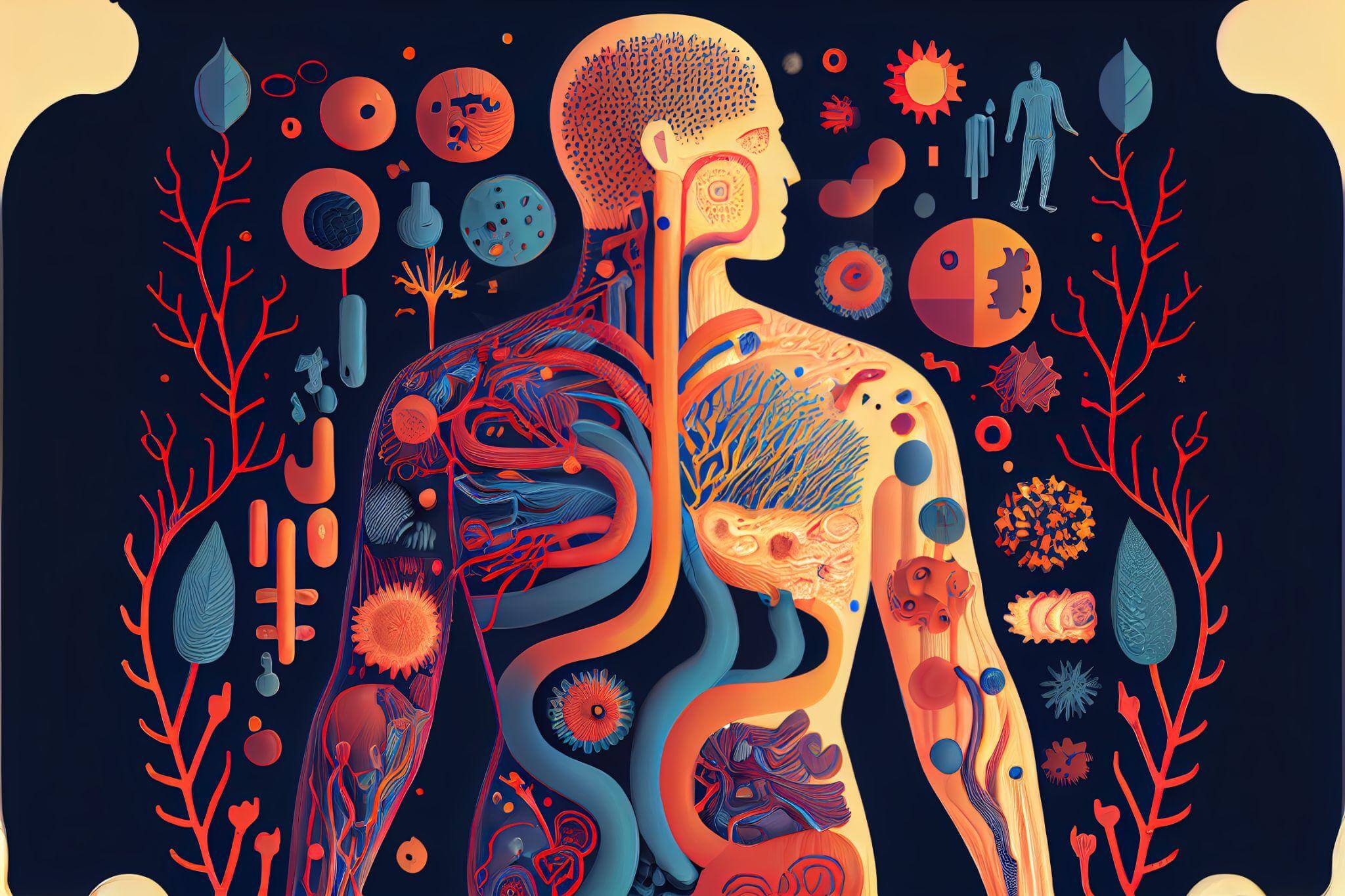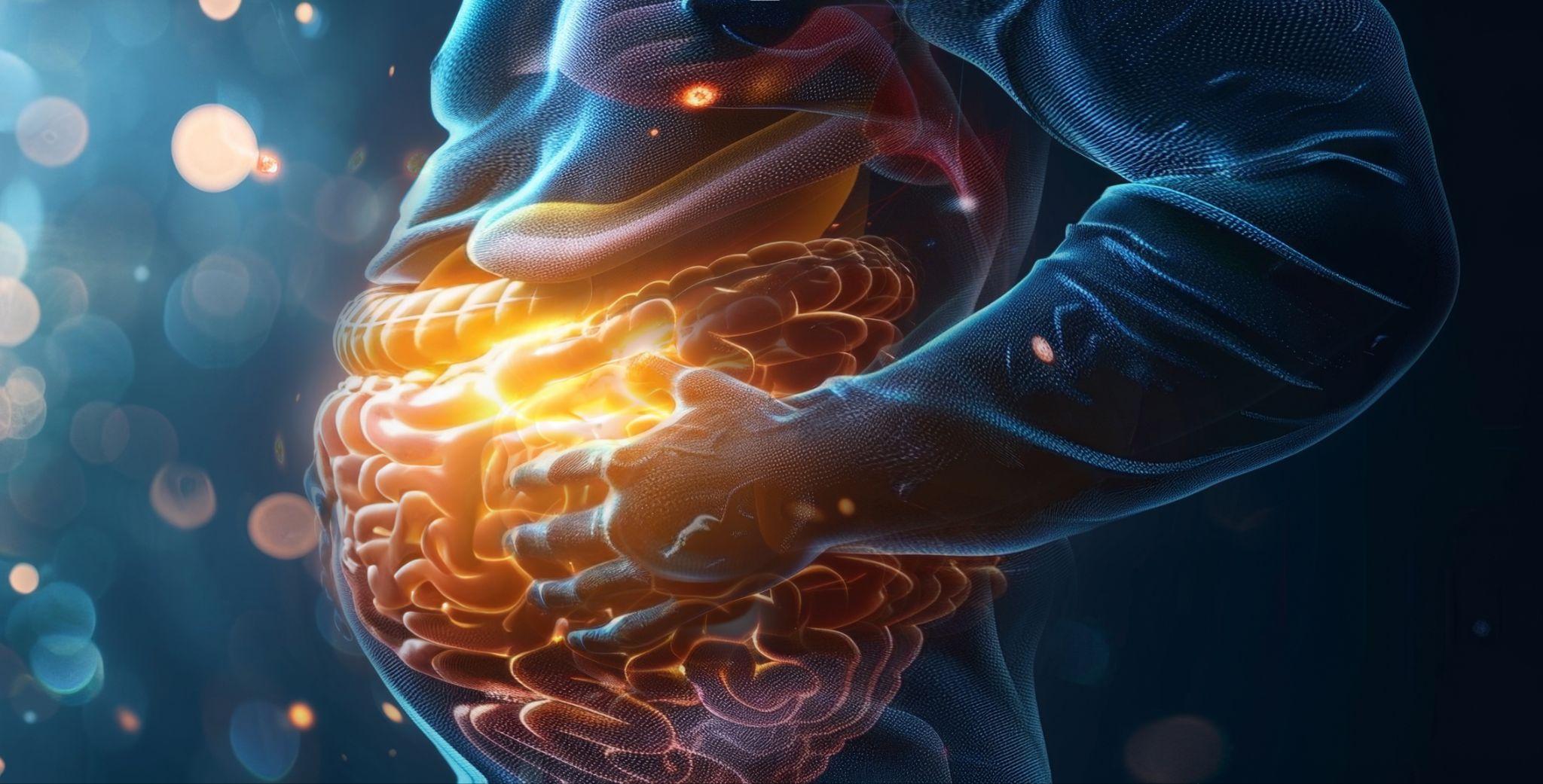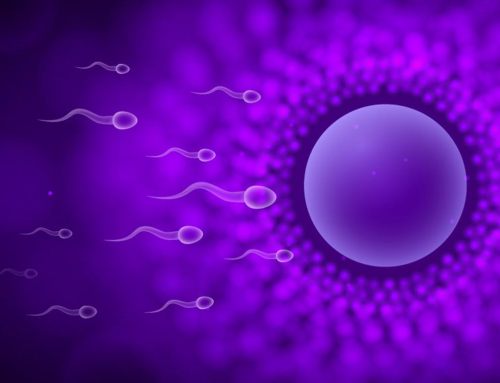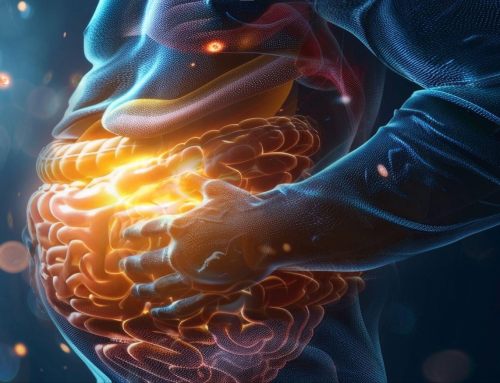Neuro Disorders, Mental Health & the Microbiota: Cases for Consideration
The famous Greek physician Hippocrates reportedly said, “Our food should be our medicine and our medicine should be our food.” Modern science is quickly proving exactly how dietary intake can influence human health, including mood and mental health. Modern tools that include the -omics, artificial intelligence, hardware, and software, have helped identify an essential player in this dynamic – the microbiota, the contingent of microorganisms that dwell in the human gut.
The microbiota dines on the food, drink, medications, and supplements we have consumed in our diets, exerting both direct and indirect influence on functions of the brain, which in turn can affect the functions of the nervous system, potentially altering moods and driving various disorders. Multiple studies have established that dysbiosis (the imbalance of the microbiota) is a driver of anxiety (1), depression (2), and Alzheimer’s disease, opening the possibility of manipulating the microbiota for prevention and treatment purposes. Embedded in the cause may be the solution to improving some aspects of mental health.
What is Mental Health?
Mental health is a catch-all term that covers the human sense of well-being regarding emotions, thoughts, and actions (3). Throughout the entire lifespan as a human, the sense of well-being (or lack of it) impacts many areas of life, such as the ability to cope with stress, have satisfactory relationships, make good decisions, and also impacts physical health.
Neuropsychiatric disorders result from disrupted brain function and find expression as unusual thoughts, behavior, or emotions. Some of the most widely known neuropsychiatric disorders negatively affecting mental health are anxiety, depression, and schizophrenia (4).
The definition of neurological disorders differs slightly, as the focus is on the physical damage to the nervous system. The damage can be widespread, including both the central and peripheral nervous systems – the brain, spine, autonomic nervous system, and neuromuscular junctions (5).
Alzheimer’s disease is a well-studied example of a neurological disorder that can negatively affect mental health, even to the point of complete physical, psychological, and emotional debilitation. Alzheimer’s disease is well-known and often a topic of conversation as it becomes more prevalent with the aging US population. The role of the microbiota regarding expressions of various neurological or neuropsychiatric disorders is much less well known. What follows are three conditions that illustrate the relationship between the microbiota and different aspects of mental health. First, a quick review of a significant feedback loop in the human body that is heavily involved in the process.
The Role of the Microbiota in the Gut-Brain Axis (A Quick Review)
The feedback loops between the brain and the microbiota are becoming more apparent as technology advances and improve the examination of microbiota, metabolites, hormones, and neurotransmitters. As studies defined a feedback loop between the enteric nervous system (ENS) and the brain, called the gut-brain axis, another player emerged through the data – the microbiota.
While the ENS is embedded in the intestines, providing sensory and chemical information to the brain, the gut microbiota lies within the tube of the intestines, interacting with the ENS. The ENS uses the vagus nerve and the bloodstream as pathways to influence the brain.
Gut microbiota can directly produce neuroendocrine metabolites such as SCFAs, GI hormones, and neurotransmitter substances that interact with the brain and various human organs. More subtly, gut microbiota can indirectly influence inflammation and immune responses (6). Details of the gut-brain-HPA and bidirectional microbiota-gut-brain feedback loops have been covered in previous articles here and here. Still, some interesting factors should be stressed here. One crucial factor is the unique role of inflammation.
Microbiota can affect the CNS through inflammation, disrupting the HPA axis, and the electrochemical nature of neurotransmission (7). A compromised gut barrier (“leaky gut”) allows substances from within the gut to pass into circulation, activating the HPA and the immune system. The activation of the immune system typically involves an inflammatory response in the form of cytokines, chemokines, and interleukins that can pass the blood-brain barrier (BBB). Interestingly, in mice, this unintended activation of the HPA and the immune system can be reversed by administering probiotics (7).
Over time, studies have identified many ways to manipulate the microbiota. As a result, the term “psychobiotic” was coined to encompass the various substances and strategies that target the microbiota with the goal of positively affecting mental health; probiotics, prebiotics, and dietary or fecal microbial transplant strategies (8).
1. Neuropsychiatric / Mood: Anxiety, Depression & the Microbiota
According to Our World in Data, anxiety is the world’s most common mental disorder, affecting over 300 million people worldwide in 2019 alone. Anxiety, “an emotion characterized by feelings of tension, worried thoughts, and physical changes like increased blood pressure… sweating, trembling, dizziness, or a rapid heartbeat” (9), often motivates people to seek relief from doctors. Physical or psychological stress induces anxiety, which manifests as physical or mental symptoms. It can become a dangerous feedback loop, progressing to the point of creating panic attacks or strain on the heart.
Having physical manifestations of anxiety makes it easier to study the condition in animal models, such as rodents, which exhibit anxiety-like behaviors that correspond to human anxiety (4). Notably, anxiety is often comorbid with depressive disorders in humans. Of patients experiencing a depressive disorder, close to two-thirds will also experience symptoms of anxiety (4). The overlap of these two conditions is unfortunate for the sufferer. However, it also offers the opportunity for one intervention to relieve both issues.
Stress, Anxiety, and the Microbiota – Stress is a driving factor in many diseases, and several studies expose the microbiota as playing a part in stress-related neuropsychologicalconditions such as anxiety and depressive disorders (4). Anxiety is often provoked in human and animal studies by applying some physical or psychological stress. For example, many anxiety studies using rodents will apply stress by causing them to swim, measuring various aspects of swimming behavior, and analyzing brain tissue, hormones, and the severity of microbial dysbiosis. Experiencing stress can cause changes in the microbiota makeup, altering the bidirectional communication between the microbiota and the central nervous system and influencing the reactions to stress (10).
Depressive disorders are also pervasive, ranking as the second-most prevalent mental disorder behind anxiety (11). In 2020, the National Survey on Drug Use and Health estimated that close to 8% of all adults 18 years or older in the US had a minimum of one major depressive episode, with females having a more significant percentage than males, and the ages 18-25 (of either sex) owning a whopping 17% of the total. Defined as a period of a minimum of two weeks of a “loss of interest or pleasure in daily activities,” major depression can be brought on by a wide variety of physical and psychological triggers (12). Estimates show that major depressive disorder (MDD) represented about a 326 billion dollar economic burden in pre-COVID 2018, made up of suicide-related costs, workplace costs, and direct costs (13). The cost in terms of human suffering cannot be calculated.
Cause… or Effect?
Neuropsychiatric disorders such as major depression can have multiple overlapping causes, such as anxiety and an exaggerated hypothalamic-pituitary-adrenal (HPA) response. Depressive symptoms can be either a cause or an effect of depression, or both. A good example of this is disturbed sleep, which can cause (or be caused by) depression. So researchers must be careful about study design, as anxiety can be confounding, being both a “comorbidity and … a predominant feature of depression” (4).
However, what is becoming increasingly clear is that the bidirectional microbiota-gut-brain (MGB) and HPA axes play a significant part in mental health. Indeed, a dysregulated HPA axis in response to various stressors has been identified in 40-60% of people diagnosed with depression (14). The MGB axis can be involved in chronic inflammation if the gut barrier is extraordinarily permeable and allows substances from the gut into the circulation. The leaked substances could include large food particles, microbial metabolites, and other microbial byproducts of microbiota. Once in circulation, these substances can cause the immune system to make pro-inflammatory substances that can cross the BBB and cause neuroinflammation by triggering the protective mechanisms of the microglia, which attempt to protect the brain’s neurons. Neuroinflammation has been shown to interact with indicators of major depressive disorder, including a dysregulated HPA, reduced serotonin in the brain, and changes in the hippocampus. (15).
Depression and Anxiety Induced by Imbalanced Microbiota – Some of the most substantial evidence of the microbiota’s role in depression and anxiety are studies on the effects of antibiotics, which reduce overall population numbers and the range of diversity of microorganisms in the microbiota. Lack of microbial diversity and numbers in the gut has been associated with numerous health conditions (16), with recent studies also linking it to depression (4). Depression and episodes of anxiety had long been reported anecdotally as a side effect of antibiotic administration in humans. In rodent studies, multiple weeks of antibiotics induced an imbalance of the microbiota called dysbiosis, with concurrent anxiety- and depression-like symptoms. Human studies were able to repeat the increased risk of depression and anxiety with penicillin and quinolone administration (4).
Depression and Anxiety Relieved or Induced by Fecal Microbiota Transplant – As summarized by Socała et al., fecal microbiota transplant (FMT) from a healthy donor to a recipient with dysbiosis resulted in improved microbiota health and apparent relief of symptoms. When FMT was performed by taking unhealthy fecal microbiota from a human and transplanting it into a healthy rodent recipient, the rodent developed behaviors roughly equivalent to human anxiety, depression, schizophrenia, and autism. Lastly, if a rodent expressing anxiety- and depression-like behaviors due to dysbiosis received an FMT from a healthy rodent, it alleviated its symptoms and dysbiosis (4). In IBS patients experiencing depression, FMT from a healthy donor alleviated symptoms (17). Other case studies on depressed patients appeared promising (18), and a review of twenty-one studies also showed proof for induction and alleviation of depression through FMT (19).
Depression and Anxiety Relieved or Induced by Probiotics – Particular strains of Lactobacillus and Bifidobacterium probiotics have been administered to rats and mice, either inducing anxiety- and depression-like behaviors in rats or preventing anxiety-like effects in parasite-infected mice (4). In humans, the same probiotics, Lactobacillus helveticus R0052 and Bifidobacterium longum R0175, relieved symptoms of clinically depressed patients (20). One study showed that Bifidobacterium infantis 35624 reversed depression-like symptoms in rats under stress, apparently lowering the levels of metabolites of two neurotransmitter substances: dopamine, and serotonin (4). Probiotics not only reversed anxiety-like and depression-like symptoms in the rat model, but Bifidobacteria normalized immune reactions and restored base levels of a neurotransmitter substance in the brainstem (21).
The Diet, Prebiotics, and the Microbiota – Altering the diet can manipulate the microbiota towards a state of health, increasing the diversity and richness of its microorganisms, which can fortify it against dysbiotic imbalance. Indeed, eating a whole foods diet rather than artificial or processed foods will contribute to gut health. Fermented foods provide a plethora of probiotic bacteria, especially the important Lactobacillus and Bifidobacterium, that contribute to brain health (22). Sauerkraut and yogurt are two readily available food sources that provide a wide range of beneficial bacteria. Additionally, many probiotic supplements are available in capsule or liquid form.
Ensuring good fiber in the diet can go a long way toward gut and brain health. Commonly called “prebiotics,” undigested fiber becomes foodstuff for microbes that create short-chain fatty acids (SCFAs), an important neuroprotective element that counters inflammation. The link between SCFAs, the microbiota, and the brain is discussed in great detail in a previous article. Soluble and insoluble fibers can become the raw materials for SCFAs, with psyllium, guar gum, and oat bran being good food sources.
2. Neurological /Neurodegenerative: Alzheimer’s & the Microbiota
Alzheimer’s disease (AD) is a neurological condition involving progressive brain function degeneration, most commonly expressed as dementia. Marked by a decline in cognition and memory, it can become an extremely debilitating condition in its most severe form. The exact cause of AD is still being investigated, but the microbiota’s growing list of impacts on the nervous system makes it a candidate for research. While AD is not as prevalent as anxiety and depression, the seriousness of the symptoms regarding mental health makes the search for remediation or prevention a worthwhile endeavor.
The Alzheimer’s Association estimates that over 6 million people in the US have Alzheimer’s dementia (23). While “dementia” is the general term for cognitive decline, AD is marked by specific physical changes in the brain. Physically, the brains of those with AD develop abnormal beta-amyloid and phosphorylated tau proteins. Neurons begin to degenerate, losing functions such as communication and the ability to repair themselves. Brain scans show a slowly receding footprint of brain volume as the degeneration progresses (23, 24).
Inflammation, the Microbiota, and Alzheimer’s Disease – Inflammation, specifically neuroinflammation, is one mechanism by which the microbiota influences AD. While it’s difficult to determine if neuroinflammation is a cause or effect of AD, studies have shown a definite correlation between the two. As in depression and anxiety, some of the immune system’s pro-inflammatory cytokines and interleukins are involved (26), leading to the possibility of continually triggering microglia. The laying down of amyloid peptides in extracellular space in the brain can also trigger the defense reactions of microglia, representing greatly increased trauma to the brain if both processes coexist.
Direct Microbial Influence on Alzheimer’s Disease – It is hypothesized that the microbiota can exert both a direct and indirect influence on AD. Dysbiosis may lead to conditions that facilitate the impact on the brain. The increased presence in the blood of pro-inflammatory bacteria Shigella and Escherichia, with a reduced presence of anti-inflammatory Escherichia rectale has been detected in AD patients with brain plaques and symptoms of cognitive decline (25).
There is much speculation and some evidence that the same forces that cause increased permeability in the gut and subsequent abnormal activation of immune system inflammation may also cause degeneration of the blood-brain barrier (BBB) (26). A compromised BBB would allow for ever-increasing amounts of neuroinflammation. Repairing a leaky gut then becomes a potential therapeutic intervention for a leaky BBB.
Alzheimer’s Disease Symptoms Relieved by Probiotics and Prebiotics – Studies of the effect of diet on AD are ongoing. Probiotics are beneficial bacteria that can help stabilize the microbiota against insults, reducing the risk of dysbiosis and the chain of events that lead to increased intestinal permeability and neuroinflammation. Increased ingestion of probiotics has been shown to slow cognitive decline and aid in risk reduction of acquiring AD (25).
As discussed previously, prebiotics are raw materials, typically fiber, that provide food for bacteria. What is not digestible for the human gets consumed by microbiota microorganisms, promoting the ecosystem’s health and vitality. As detailed in a previous article, the microbiota creates short-chain fatty acids (SCFAs) from prebiotic fiber such as psyllium which can cross the BBB and act as a protective mechanism by helping to reduce neuroinflammation (25, 27).
Summary
The use of diet to influence the mind and body is an old practice. However, with the tools of modern science, helpful details are emerging, such as exactly what kinds of dietary intake alleviate neuropsychiatric and neurological conditions, sometimes down to the specific strain of bacteria. Since these foods and supplements are relatively free of side effects compared to medications, they are worth exploring. Removing inflammatory processed foods and consciously selecting probiotics and prebiotics to fortify the diet will likely increase the diversity and richness of bacterial presence in the microbiota, stabilizing the microbiota against adversity and bolstering mood.
Advances in genomics and metabolomics will assuredly make FMT a more reliable alternative treatment for neurological and neuropsychiatric disorders. However, because FMT can also make a recipient unhealthy, technologies that advance the appraisal of the donor microbiota will significantly improve the therapy.
Sources:
(1) Schnorr SL, Bachner HA. Integrative Therapies in Anxiety Treatment with Special Emphasis on the Gut Microbiome. Yale J Biol Med. 2016 Sep 30;89(3):397-422. PMID: 27698624; PMCID: PMC5045149.
(2)Winter G, Hart RA, Charlesworth RPG, Sharpley CF. Gut microbiome and depression: what we know and what we need to know. Rev Neurosci. 2018 Aug 28;29(6):629-643. doi: 10.1515/revneuro-2017-0072. PMID: 29397391.
(3) What is mental health? [Internet]. What Is Mental Health? | MentalHealth.gov. [cited 2023Mar24]. Available from: https://www.mentalhealth.gov/basics/what-is-mental-health
(4) Socała K, Doboszewska U, Szopa A, Serefko A, Włodarczyk M, Zielińska A, Poleszak E, Fichna J, Wlaź P. The role of microbiota-gut-brain axis in neuropsychiatric and neurological disorders. Pharmacol Res. 2021 Oct;172:105840. doi: 10.1016/j.phrs.2021.105840. Epub 2021 Aug 24. PMID: 34450312.
(5) Mental health: Neurological disorders [Internet]. World Health Organization. World Health Organization; [cited 2023Mar24]. Available from: https://www.who.int/news-room/questions-and-answers/item/mental-health-neurological-disorders
(6) Cussotto S, Sandhu KV, Dinan TG, Cryan JF. The neuroendocrinology of the microbiota-gut-brain axis: A behavioural perspective [Internet]. Frontiers in Neuroendocrinology. Academic Press; 2018 [cited 2022Aug12]. Available from: https://www.sciencedirect.com/science/article/abs/pii/S0091302218300396 ]
(7) Jiang H, Ling Z, Zhang Y, Mao H, Ma Z, Yin Y, et al. Altered fecal microbiota composition in patients with major depressive disorder. Brain, Behavior, and Immunity. 2015;48:186–94.
(8) Berding K, Cryan JF. Microbiota-targeted interventions for mental health. Curr Opin Psychiatry. 2022 Jan 1;35(1):3-9. doi: 10.1097/YCO.0000000000000758. PMID: 34750307; PMCID: PMC8654258.
(9) Anxiety [Internet]. American Psychological Association. American Psychological Association; [cited 2023Mar24]. Available from: https://www.apa.org/topics/anxiety/
(10) Foster JA, McVey Neufeld K-A. Gut–Brain Axis: How the microbiome influences anxiety and depression. Trends in Neurosciences. 2013;36(5):305–12.
(11) Mental or Neurodevelopmental Disorder by Type [Internet]. Our World in Data. [cited 2023Mar24]. Available from: https://ourworldindata.org/grapher/number-with-mental-and-neurodevelopmental-disorders-by-type
(12) Major depression [Internet]. National Institute of Mental Health. U.S. Department of Health and Human Services; [cited 2023Mar24]. Available from: https://www.nimh.nih.gov/health/statistics/major-depression
(13) Greenberg PE, Fournier A-A, Sisitsky T, Simes M, Berman R, Koenigsberg SH, et al. The economic burden of adults with major depressive disorder in the United States (2010 and 2018). PharmacoEconomics. 2021;39(6):653–65.
(14) Tremblay A, Lingrand L, Maillard M, Feuz B, Tompkins TA. The effects of psychobiotics on the microbiota-gut-brain axis in early-life stress and neuropsychiatric disorders. Progress in Neuro-Psychopharmacology and Biological Psychiatry. 2021;105:110142.
(15) Troubat R, Barone P, Leman S, Desmidt T, Cressant A, Atanasova B, Brizard B, El Hage W, Surget A, Belzung C, Camus V. Neuroinflammation and depression: A review. Eur J Neurosci. 2021 Jan;53(1):151-171. doi: 10.1111/ejn.14720. Epub 2020 Mar 20. PMID: 32150310.
(16) Kriss M, Hazleton KZ, Nusbacher NM, Martin CG, Lozupone CA. Low diversity gut microbiota dysbiosis: drivers, functional implications and recovery. Curr Opin Microbiol. 2018 Aug;44:34-40. doi: 10.1016/j.mib.2018.07.003. Epub 2018 Jul 20. PMID: 30036705; PMCID: PMC6435260.
(17) Collyer R, Clancy A, Borody T. Faecal microbiota transplantation alleviates symptoms of depression in individuals with Irritable Bowel Syndrome: A case series. Medicine in Microecology. 2020;6:100029.
(18) Doll JPK, Vázquez-Castellanos JF, Schaub AC, Schweinfurth N, Kettelhack C, Schneider E, Yamanbaeva G, Mählmann L, Brand S, Beglinger C, Borgwardt S, Raes J, Schmidt A, Lang UE. Fecal Microbiota Transplantation (FMT) as an Adjunctive Therapy for Depression-Case Report. Front Psychiatry. 2022 Feb 17;13:815422. doi: 10.3389/fpsyt.2022.815422. PMID: 35250668; PMCID: PMC8891755.
(19) Chinna Meyyappan A, Forth E, Wallace CJ, Milev R. Effect of fecal microbiota transplant on symptoms of psychiatric disorders: A systematic review. BMC Psychiatry. 2020;20(1).
(20) Berding K, Cryan JF. Microbiota-targeted interventions for mental health. Curr Opin Psychiatry. 2022 Jan 1;35(1):3-9. doi: 10.1097/YCO.0000000000000758. PMID: 34750307; PMCID: PMC8654258.
(21) Desbonnet L, Garrett L, Clarke G, Kiely B, Cryan JF, Dinan TG. Effects of the probiotic bifidobacterium infantis in the maternal separation model of depression. Neuroscience. 2010;170(4):1179–88.
(22) Selhub EM, Logan AC, Bested AC. Fermented foods, microbiota, and Mental Health: Ancient Practice Meets Nutritional Psychiatry. Journal of Physiological Anthropology. 2014;33(1).
(23) Alzheimer’s association | alzheimer’s disease & dementia help [Internet]. [cited 2023Mar24]. Available from: https://www.alz.org/media/Documents/alzheimers-facts-and-figures.pdf
(24) What happens to the brain in alzheimer’s disease? [Internet]. National Institute on Aging. U.S. Department of Health and Human Services; [cited 2023Mar24]. Available from: https://www.nia.nih.gov/health/what-happens-brain-alzheimers-disease
(25) Angelucci F, Cechova K, Amlerova J, Hort J. Antibiotics, gut microbiota, and Alzheimer’s disease. J Neuroinflammation. 2019 May 22;16(1):108. doi: 10.1186/s12974-019-1494-4. PMID: 31118068; PMCID: PMC6530014.
(26) Morris G, Fernandes BS, Puri BK, Walker AJ, Carvalho AF, Berk M. Leaky brain in neurological and psychiatric disorders: Drivers and consequences. Aust N Z J Psychiatry. 2018 Oct;52(10):924-948. doi: 10.1177/0004867418796955. PMID: 30231628.
(27) Barbosa RSD, Vieira-Coelho MA. Probiotics and prebiotics: focus on psychiatric disorders – a systematic review. Nutr Rev. 2020 Jun 1;78(6):437-450. doi: 10.1093/nutrit/nuz080. PMID: 31769847.












